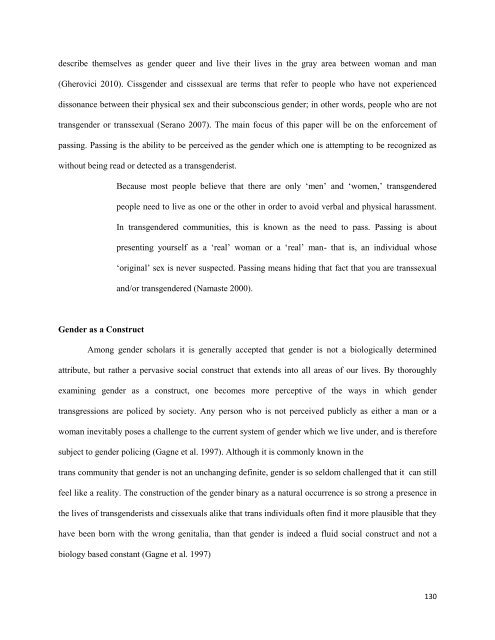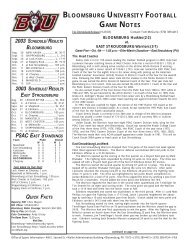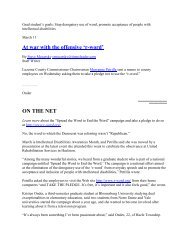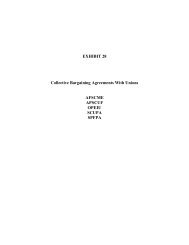Human Rights at Home and Abroad: Past, Present, and Future
Human Rights at Home and Abroad: Past, Present, and Future
Human Rights at Home and Abroad: Past, Present, and Future
You also want an ePaper? Increase the reach of your titles
YUMPU automatically turns print PDFs into web optimized ePapers that Google loves.
describe themselves as gender queer <strong>and</strong> live their lives in the gray area between woman <strong>and</strong> man<br />
(Gherovici 2010). Cissgender <strong>and</strong> cisssexual are terms th<strong>at</strong> refer to people who have not experienced<br />
dissonance between their physical sex <strong>and</strong> their subconscious gender; in other words, people who are not<br />
transgender or transsexual (Serano 2007). The main focus of this paper will be on the enforcement of<br />
passing. Passing is the ability to be perceived as the gender which one is <strong>at</strong>tempting to be recognized as<br />
without being read or detected as a transgenderist.<br />
Gender as a Construct<br />
Because most people believe th<strong>at</strong> there are only ‗men‘ <strong>and</strong> ‗women,‘ transgendered<br />
people need to live as one or the other in order to avoid verbal <strong>and</strong> physical harassment.<br />
In transgendered communities, this is known as the need to pass. Passing is about<br />
presenting yourself as a ‗real‘ woman or a ‗real‘ man- th<strong>at</strong> is, an individual whose<br />
‗original‘ sex is never suspected. Passing means hiding th<strong>at</strong> fact th<strong>at</strong> you are transsexual<br />
<strong>and</strong>/or transgendered (Namaste 2000).<br />
Among gender scholars it is generally accepted th<strong>at</strong> gender is not a biologically determined<br />
<strong>at</strong>tribute, but r<strong>at</strong>her a pervasive social construct th<strong>at</strong> extends into all areas of our lives. By thoroughly<br />
examining gender as a construct, one becomes more perceptive of the ways in which gender<br />
transgressions are policed by society. Any person who is not perceived publicly as either a man or a<br />
woman inevitably poses a challenge to the current system of gender which we live under, <strong>and</strong> is therefore<br />
subject to gender policing (Gagne et al. 1997). Although it is commonly known in the<br />
trans community th<strong>at</strong> gender is not an unchanging definite, gender is so seldom challenged th<strong>at</strong> it can still<br />
feel like a reality. The construction of the gender binary as a n<strong>at</strong>ural occurrence is so strong a presence in<br />
the lives of transgenderists <strong>and</strong> cissexuals alike th<strong>at</strong> trans individuals often find it more plausible th<strong>at</strong> they<br />
have been born with the wrong genitalia, than th<strong>at</strong> gender is indeed a fluid social construct <strong>and</strong> not a<br />
biology based constant (Gagne et al. 1997)<br />
130
















